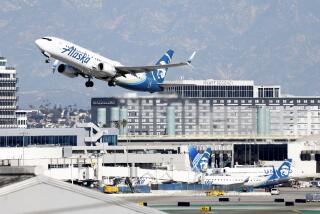The Bottom Line at 30,000 Feet
- Share via
It’s one thing when airlines drop in-flight meals to cut costs. It’s another when pilots worry that cost-cutting might be endangering passenger safety. It’s scary enough, for instance, to have an engine on a London-bound airliner fail during takeoff from LAX, as happened Feb. 19, when British Airways Flight 268 lost one of its four engines and observers heard popping noises and saw sparks flying from the engine. But what must passengers have been thinking as the pilot circled over Santa Monica Bay for several minutes before announcing from the cockpit that the plane would continue on the 5,400-mile transatlantic flight?
More than 10 hours later, the Boeing 747 ran short of fuel and was forced to make an emergency landing in Manchester, England. Some observers, including a British pilots association, questioned whether British Airways, which has been furiously cutting costs to improve its bottom line, had pressured its pilot to make the flight to save money. Direct pressure was unlikely because airline pilots have the final say in safety matters. But in an atmosphere of continuous financial losses, it’s hard to believe that passenger safety will go unthreatened.
British Airways executives have tried to downplay the potential danger by arguing that its pilot followed established safety procedures, and that the 747 is designed to fly safely with only two engines, much less three. But news reports about the unusual flight did nothing to reassure frequent fliers. From a passenger’s perspective, it’s hard to believe that a pilot wouldn’t want to land as soon as possible to assess the loss of an engine during takeoff. Even if it meant dumping tons of aviation fuel into the ocean before landing, making repairs and possibly rebooking passengers on later flights.
An added element in this incident was a new European Union regulation that requires airlines to compensate travelers for meals, overnight accommodations and other expenses if long flights are delayed for more than five hours.
It might be mostly labor/management politicking, but even before Flight 268 took off, the British Air Line Pilots Assn. expressed concern that the EU compensation rule would increase pressure on flight crews to meet posted schedules. That’s not a message passengers want to hear. Not when United Airlines and US Airways are operating out of U.S. Bankruptcy Court, Delta has been scrambling to avoid landing in the same place, and few airlines can count themselves really healthy.
More to Read
Inside the business of entertainment
The Wide Shot brings you news, analysis and insights on everything from streaming wars to production — and what it all means for the future.
You may occasionally receive promotional content from the Los Angeles Times.










